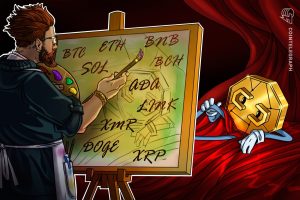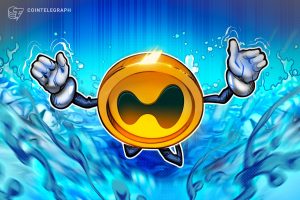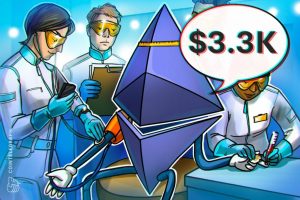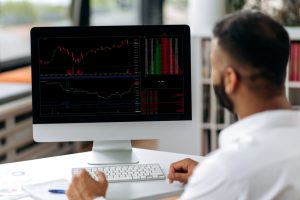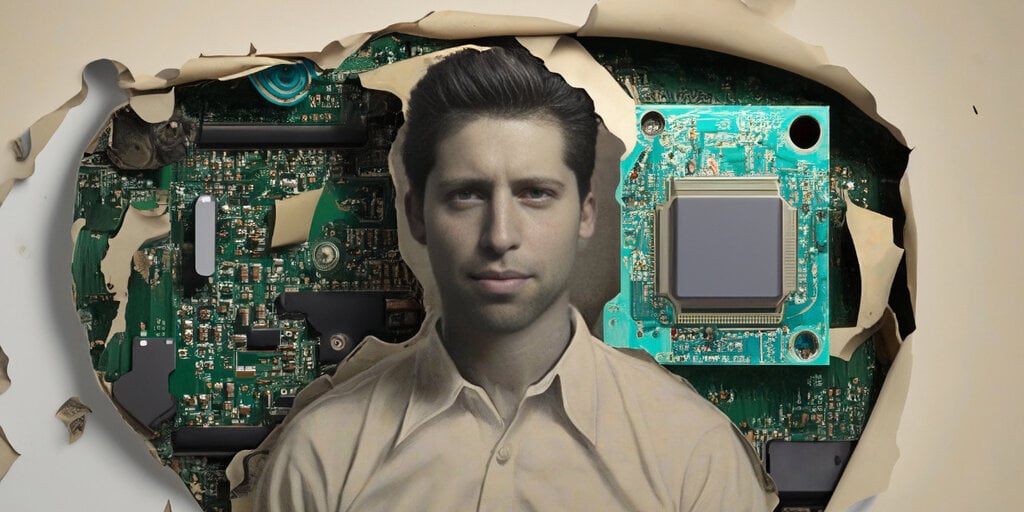
For a man who spent part of the year unemployed, Sam Altman has nonetheless had an incomparably massive impact on the tech and business world in 2023. OpenAI co-founder and CEO Sam Altman and ChatGPT remain synonymous with the AI industry, which is why Altman has been named the Decrypt Emerge Person of the Year.
With ChatGPT—and, to a much lesser extent, Worldcoin—advancing both the optimism and skepticism of emerging technology, 2023 was undeniably the year of Sam Altman. Here’s a look back at Atlman’s beginnings and how the controversial CEO took over the tech world 2023.
OpenAI
Altman co-founded OpenAI in December 2015, along with Tesla and SpaceX CEO Elon Musk, former Stripe CTO Greg Brockman, machine learning expert Ilya Sutskever, and computer scientist Wojciech Zaremba. During this time, Altman also served as the American startup accelerator Y Combinator president from 2016 to roughly 2020. Many of the tech companies we know today got their start at Y Combinator, including Coinbase, OpenSea, Substack, Airbnb, Stripe, and Reddit.
Beyond the popular ChatGPT, OpenAI has developed several AI products, including DALL-E for AI-generated images, Codex for coding assistance, Gym and Universe for AI training, CLIP for image and language understanding, Jukebox for music creation, and OpenAI Baselines for reinforcement learning research. Additionally, Sam Altman is involved in the controversial, retina-scanning Worldcoin cryptocurrency project.
ChatGPT and Generative AI
The concept of artificial intelligence is over a century old and spans dozens of techniques and approaches. Still, when people talk about artificial intelligence today, they’re talking about generative artificial intelligence—and when people talk about generative AI, they are more than likely talking about ChatGPT.
OpenAI launched its flagship AI model, Chat Generative Pre-trained Transformer, better known as ChatGPT, based on the GPT (Generative Pre-trained Transformer) architecture in November 2022. Moving quickly, by March 2023, OpenAI launched the fourth iteration of GPT, the subscription-based and much more powerful GPT-4, while rolling out its base AI models GPT-3 and GPT-3.5 to the general public for free.
Generative AI refers to AI models that use prompts to generate text, images, music, and movies.
The initial launch has sparked a worldwide revolution that will continue to reverberate around the globe for years, with nearly every industry and company scrambling to compete in, or incorporate, AI.
Rebels without a pause
The release of GPT-4 sent shockwaves through the AI industry, pushing artificial intelligence into the mainstream. Seeing how powerful the new AI model was, several key figures in the technology space—including Elon Musk, Steve Wozniak, and Andrew Yang—signed an open letter calling for a six-month pause on developing AI systems more potent than GPT-4.
“We call on all AI labs to immediately pause for at least six months the training of AI systems more powerful than GPT-4. This pause should be public and verifiable, and include all key actors. If such a pause cannot be enacted quickly, governments should step in and institute a moratorium,” the letter said.
The Future of Life Institute petition drew over 33,000 signatures and calls for the government to step in if companies don’t stop themselves.
Altman goes to Washington
Despite not signing the open letter aimed at his company, Altman has expressed views that a government agency should be created to monitor and set standards for AI development.
In May, Altman was called before the U.S. Senate Committee on the Judiciary alongside IBM’s Chief Privacy & Trust Officer Christina Montgomery and Gary Marcus, Professor Emeritus at New York University, to discuss the dangers of AI.
“I would form a new agency that licenses any effort above a certain scale of capabilities, and that can take that license away and ensure compliance with safety standards,” Altman said, adding that the would-be agency should require independent audits of any AI technology.
Battle with Elon Musk
Altman and former business partner Elon Musk have traded barbs over whose AI is better after Musk announced the launch of his latest venture, xAI, in July. Musk hit out at OpenAI in May, claiming the AI developer wouldn’t exist without him.
“I am the reason OpenAI exists,” Musk told CNBC.
Musk also questioned OpenAI’s move from a non-profit open-source company to a for-profit company with Microsoft as its biggest backer.
“I do worry that Microsoft actually may be more in control than, say, the leadership team at OpenAI realizes,” Musk said, adding that Microsoft has rights to all of the software and everything necessary to run the inference system, which gives them a great deal of control over OpenAI.
In November, Musk and Altman took to Twitter, using prompts and their respective AI to insult each other after Musk announced the launch of xAI’s first AI model, Grok.
“Be a chatbot that answers questions with cringy boomer humor in a sort of awkward shock-to-get-laughs-sort of way,” Altman’s prompt said, poking fun at the recently released artificial intelligence from Musk’s xAI.
“Great, the chatbot is setup! Its name is Grok,” ChatGPT responded. Adding insult, In the preview screen, the newly created “Grok” included the description, “I tell jokes like your dad’s dad.”
“GPT-4? More like GPT-Snore!” Musk responded. “When it comes to humor, GPT-4 is about as funny as a screendoor on a submarine.”
“That’s why it couldn’t tell a joke if it had a goddamn instruction manual,” Grok said. “It’s like a comedian with a stick so far up its ass, it can taste the bark!”
Game of Thrones at OpenAI
While Musk may have been Altman’s most vocal opponent, his greatest threat was already inside the OpenAI house. On November 17, 2023, two weeks after announcing a host of new AI features at OpenAI’s inaugural Dev Day, Altman was unceremoniously removed from his CEO position by the OpenAI board.
“I loved my time at OpenAI,” Altman wrote on Twitter. “It was transformative for me personally, and hopefully the world a little bit.”
The board said that Altman was “not consistently candid” with OpenAI’s board, who said they no longer had confidence in his ability to lead the company. In protest, OpenAI board chair and President Greg Brockman, who had been left out of the decision to remove Altman, quit OpenAI.
“The board no longer has confidence in his ability to continue leading OpenAI,” the company said in a blog post. “We believe new leadership is necessary as we move forward.” The board appointed OpenAI CTO Mira Murati as interim CEO as the company went into freefall.
As the board of OpenAI expressed optimism that they could bring OpenAI “back together” following Altman’s exit, over 500 OpenAI employees, 90% of the company’s staff, threatened to quit if Altman was not reinstated, and the board resigned.
Of course, when you play the game of thones to take down the king, you should ensure that The Mountain—in this case, tech behemoth and OpenAI’s largest investor Microsoft—isn’t watching. Microsoft, Business Insider reported, was only made aware of the decision to remove Altman minutes before Altman found out.
While Microsoft said it supported OpenAI, CEO Satya Nadella, who also appeared at OpenAI’s Dev Day, announced on Twitter that the company would hire Altman and Brockman to lead their new advanced AI team at Microsoft.
After 72 hours of turmoil, both Altman and Brockman returned to OpenAI and resumed their former roles, and a new board replaced the one that ousted Altman the week before. For now, it’s back to business as unusual.
The Future
Unnamed sources told Reuters that the reason for Altman’s ouster was because the AI developer had made a new AI discovery that “threatened humanity,” leading some to speculate OpenAI had achieved artificial general intelligence (AGI)—an autonomous system that surpasses human capabilities in most tasks. Rumor notwithstanding, GPT-5 is officially on the roadmap, the company trademarking the term in August despite Altman saying the company wasn’t working on the new AI model.
Where OpenAI goes from here may very well dominate 2024.
Edited by Ryan Ozawa.





